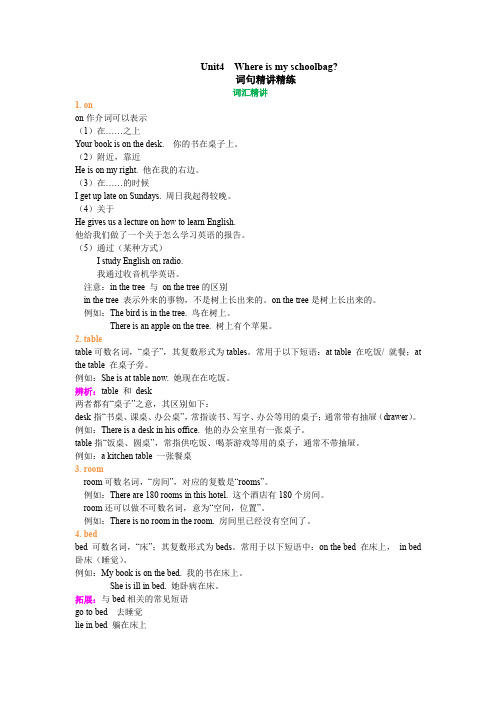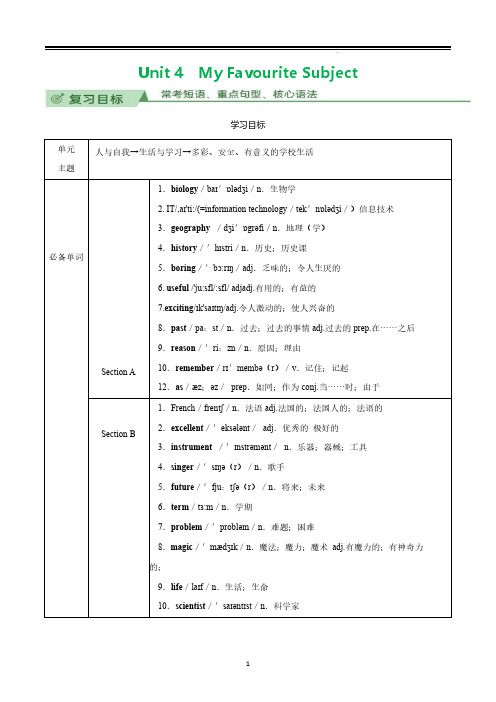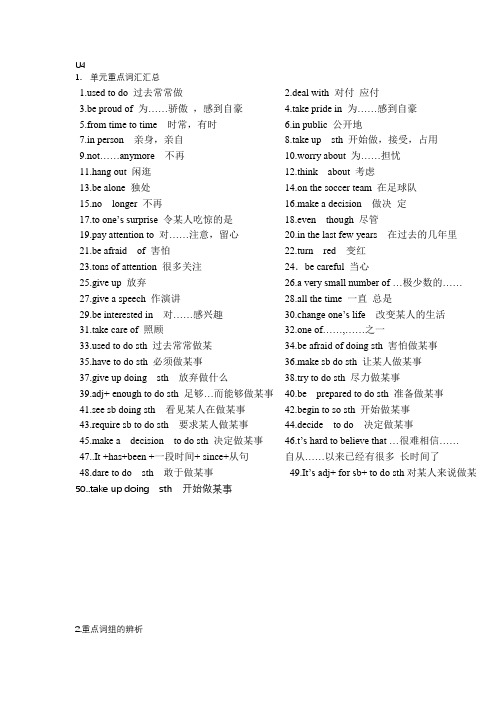初中英语UNIT 4知识点
人教版七年级英语下册Unit4 要点详解1

Don ’t eat in class.要点详解1. arrive, reach, get以上三词均可表示“到达、抵达”之意,但用法不同。
arrive 后接at (小地方)或in (大地方——城市、国家)reach 直接连“某地”,get 加to 后再接某地。
如:I arrived in Beijing yesterday.They reached the Great Wall by bus.How can I get to the TV station?若要表示“到家/这儿/那儿”时,用arrive / reach / get 均可。
即:arrive / reach / get home / here / there2. in class 和in the classin class 表示“在上课”,而in the class 表示“在班上”。
Don’t talk in class.上课时不要谈话。
There are 40 students in the class.这个班有40位学生。
类似的短语还有:at table at the table in hospital in the hospital out of question out of the question in front of in the front of 在进餐在桌上(生病等)住院在医院毫无疑问不可能的在……的前面在……的前部⎧⎨⎩⎪⎧⎨⎩⎪⎧⎨⎩⎪⎧⎨⎩⎪3. have to 和mustmust 表示“必须、应该”,是从主观出发的,同时must 意味着一种“责任”与“义务”。
如:We must help our parents do some housework.have to “必须”“不得不”,常表示受外界环境、条件所迫要做的事。
如:There is nothing in the fridge. I have to go shopping now.4. else 其他的else 表示“其他的,此外”,常被置于特殊疑问句、不定代词之后。
仁爱英语八年级上册unit 4的知识点

仁爱英语八年级上册unit 4的知识点Unit 4是仁爱英语八年级上册的一个重要单元,本单元的主题是“地球村”,主要内容包括国际会议、计划和国际组织等。
在学习本单元之前,建议学生们先了解一些有关国家、地图和文化的基础知识。
在这篇文章中,我们将介绍本单元的主要知识点及其重点内容。
一、重点词汇1. conference: 会议2. organization: 组织3. charity: 慈善机构4. global: 全球的5. pollution: 污染6. poverty: 贫穷7. famine: 饥荒8. treaty: 条约9. alliance: 联盟10. epidemic: 流行病二、重点句型1. We must take action to solve environmental problems.2. The United Nations is an international organization promoting cooperation among nations.3. A treaty is an agreement between two or more countries.4. The World Health Organization is a specialized agency of the United Nations that is concerned with international public health.5. The Red Cross is an international humanitarian organization providing assistance during conflicts and disasters.三、重点内容1. 国际会议本单元将介绍几种国际组织和会议,主要包括联合国、世界贸易组织、世界卫生组织和气候变化公约。
人教版七下英语unit4语法知识点

人教版七下英语unit4语法知识
点
wear v.穿着:戴着(状态)接衣帽、饰物等 wear a
skirt/hat/watch wear masks戴口罩 wear a smile面带微笑put on穿上;戴上(动作) Put on your sweater!穿上你的毛衣!
Section A
important adj.重要的 it s important for sb.to do sth.做某事对某人来说是重要的 It's very important for us to wear masks now.现在戴口罩对我们来说是非常重要的。
importance n.重要性 the importance of health健康的重
要性
quiet adj.形容词安静的(修饰n.或放be/系动词后)
quite adv.副词很,非常(相当于very) be quiet/keep quiet/stay保持安静 We have to be/keep quiet in the library.在图书馆里我们必须保持安静
情态动词must表示“必须;务必用法:主语+must+动词原形+其他例句:You must wear the school uniform at school。
人教版初中英语初一上册Unit4 知识点总结与练习

Unit4 Where is my schoolbag?词句精讲精练词汇精讲1. onon作介词可以表示(1)在……之上Your book is on the desk. 你的书在桌子上。
(2)附近,靠近He is on my right. 他在我的右边。
(3)在……的时候I get up late on Sundays. 周日我起得较晚。
(4)关于He gives us a lecture on how to learn English.他给我们做了一个关于怎么学习英语的报告。
(5)通过(某种方式)I study English on radio.我通过收音机学英语。
注意:in the tree 与on the tree的区别in the tree 表示外来的事物,不是树上长出来的。
on the tree是树上长出来的。
例如:The bird is in the tree. 鸟在树上。
There is an apple on the tree. 树上有个苹果。
2. tabletable可数名词,“桌子”,其复数形式为tables。
常用于以下短语:at table 在吃饭/ 就餐;at the table 在桌子旁。
例如:She is at table now. 她现在在吃饭。
辨析:table 和desk两者都有“桌子”之意,其区别如下:desk指“书桌、课桌、办公桌”,常指读书、写字、办公等用的桌子;通常带有抽屉(drawer)。
例如:There is a desk in his office. 他的办公室里有一张桌子。
table指“饭桌、圆桌”,常指供吃饭、喝茶游戏等用的桌子,通常不带抽屉。
例如:a kitchen table 一张餐桌3. roomroom可数名词,“房间”,对应的复数是“rooms”。
例如:There are 180 rooms in this hotel. 这个酒店有180个房间。
人教版初中英语新教材七年级上Unit4知识点归纳总结(复习必背)

Unit4My FavouriteSubject常考句型1.谈论最喜欢的学科:-What 's your favourite subject ?你最喜欢的学科是什么?-My favourite subject is English.我最喜欢的学科是英语。
2.询问原因并给出理由:-Why do you like it ?你为什么喜欢它?-It 's interesting to learn about the past.了解过去是有趣的。
3.How about ...?询问他人意见:How about you ,Binbin ?你呢,斌斌?4.It 's +形容词+to do sth .:Sometimes it 's difficult to remember all the information .有时很难记住所有的信息。
语音知识1.双元音/eɪ//aɪ//ɔɪ//əʊ//aʊ//ɪə//eə//ʊə/2.连读重点语法连词and 、but 和because 的用法主题写作讨论对学科的喜好Section A Why do you like this subject?1.Ella doesn't like history /geography because it's hard /boring .埃拉不喜欢历史/地理,因为它是困难的/无聊的。
(教材第44页1c )boring [形容词]乏味的;令人生厌的一般用来说明事物的特征,指事物本身无趣。
The story is boring.这个故事很无聊。
【拓展】bored [形容词]感到厌烦的,厌倦的常用来修饰人,说明人的感受。
常用搭配:be /get bored with sth 对······感到厌烦。
The children quickly get bored with the boring game.孩子们很快就厌烦了这个无聊的游戏。
人教版(新目标)初中英语九年级上册Unit4知识点汇总

humorous[ˈhjuːmərəs]有幽默感的;滑稽有趣的silent[ˈsaɪlənt]不说话的;沉默的helpful['helpfəl]有用的;有帮助的from time to time[frɒm//taɪm//tuː//taɪm]时常;有时score[skɔː]得分;打分background[ˈbækɡraʊnd]背景interview[ˈɪntəvjuː]采访;面试 n. Asian[ˈeɪʃ(ə)nˌˈeɪʒ(ə)n]亚洲的;亚洲人的,亚洲人deal with对付;应付dare[deə]敢于;胆敢private[ˈpraɪvɪt]私人的;私密的guard[ɡɑːd]警卫;看守v.守卫;保卫require[rɪˈkwaɪə]需要;要求European[jʊərəˈpiːən]欧洲的;欧洲人的British['brɪtɪʃ]英国的;英国人的speech[spiːtʃ]讲话;发言ant[ænt]蚂蚁insect[ˈɪnsekt]昆虫influence[ˈɪnflʊəns]影响seldom[ˈseldəm]不常;很少proud[praʊd]自豪的;骄傲的be proud of为⋯⋯骄傲;感到自豪absent[ˈæbsənt]缺席;不在fail[feɪl]失败;未能(做到)examination[ɪgˌzæmɪ'neɪʃən]考试;审查boarding school寄宿学校in person亲身;亲自exactly[ɪg'zæktli]确切地;精确地pride[praɪd]自豪;骄傲take pride in为⋯⋯感到自豪grandson[ˈɡrændsʌn]孙子;外孙general[ˈdʒenər(ə)l]普遍的;常规的;总的将军introduction[ɪntrəˈdʌkʃ(ə)n]介绍Paula 葆拉(女名)Alfred 艾尔弗雷德(男名)Billy 比利(男名)Candy 坎迪(女名)Jerry 杰里(男名);杰丽(女名)Emily 埃米莉(女名)02 U n i t 4 知识梳理Unit4 I used to be afraid of the dark.【重点短语】ed to do 过去常常做2.deal with 对付应付3.be proud of 为……骄傲,感到自豪4.take pride in 为……感到自豪5.fromtime to time 时常,有时6.i n public 公开地7.i n person 亲身,亲自8.t ake up sth 开始做,接受,占用9.not……anymore不再10.worry about 为……担忧11.hang out 闲逛12.thinkabout 考虑13.be alone 独处14.on the soccer team 在足球队15.no longer 不再16.make a decision 做决定17.to one’s surprise 令某人吃惊的是18.even though 尽管19.pay attention to 对……注意,留心20.in the last few years 在过去的几年里21.be afraid of 害怕22.turn red 变红23.tons of attention 很多关注24.be careful 当心25.give up 放弃26.a very small number of …极少数的……27.give a speech 作演讲28.all the time 一直总是29.be interested in 对……感兴趣30.change one’s life 改变某人的生活31.take care of 照顾32.one of…, ……之一【重点句型】1. I used to be afraid of the dark. 我过去常常前害怕黑暗.2.I go to sleep with my bedroom light on. 我开着卧室的灯睡觉.3.I used to spend a lot of time playing games with my friends. 以前我常常花很多时间和我的朋友们玩游戏.4.I hardly ever have time for concerts.我几乎没有时间去听音乐会.5.My life has changed a lot in the last few years.我的生活在过去几年里改变了很多.6.It will make you stressed out.那会使你紧张的.7.It seems that Yu Mei has changed a lot.玉梅似乎变化很大.03词汇精讲1.silentsilent是形容词,意为“沉默的;无言的”,其名词形式为silence。
Unit4单元知识点汇总 人教版英语九年级全册

U41.单元重点词汇汇总ed to do 过去常常做2.deal with 对付应付3.be proud of 为……骄傲,感到自豪4.take pride in 为……感到自豪5.from time to time 时常,有时6.in public 公开地7.in person 亲身,亲自8.take up sth 开始做,接受,占用9.not……anymore 不再10.worry about 为……担忧11.hang out 闲逛12.think about 考虑13.be alone 独处14.on the soccer team 在足球队15.no longer 不再16.make a decision 做决定17.to one’s surprise 令某人吃惊的是18.even though 尽管19.pay attention to 对……注意,留心20.in the last few years 在过去的几年里21.be afraid of 害怕22.turn red 变红23.tons of attention 很多关注24.be careful 当心25.give up 放弃26.a very small number of …极少数的……27.give a speech 作演讲28.all the time 一直总是29.be interested in 对……感兴趣30.change one’s life 改变某人的生活31.take care of 照顾32.one of……,……之一ed to do sth 过去常常做某34.be afraid of doing sth 害怕做某事35.have to do sth 必须做某事36.make sb do sth 让某人做某事37.give up doing sth 放弃做什么38.try to do sth 尽力做某事39.adj+ enough to do sth 足够…而能够做某事40.be prepared to do sth 准备做某事41.see sb doing sth 看见某人在做某事42.begin to so sth 开始做某事43.require sb to do sth 要求某人做某事44.decide to do 决定做某事45.make a decision to do sth 决定做某事46.t’s hard to believe that …很难相信……47..It +has+been +一段时间+ since+从句自从……以来已经有很多长时间了48.dare to do sth 敢于做某事49.It’s adj+ for sb+ to do sth对某人来说做某50..take up doing sth 开始做某事2.重点词组的辨析辨析:used to do sth. 过去常常做…get/be used to sth./doing sth. 现在习惯于…be used to do 被用于做…(被动语态)be used by 由(被)…使用(被动语态)be used as … 被当做…使用(被动语态)be used for doing 被用于做…(被动语态)例: I used to go to work by bus. Now I take a taxi.He used to be a problem boy. She used to be very shy.I’m used to drinking a cup of water after meal.He’s been used to living in the dormitory.A hammer is used to drive nails.This machine is used to clean the floor.The girl is being used as a servant in the house.A knife can be used for cutting bread.used to的用法“used to+动词原形”表示过去常常干某事,现在不在干了。
Unit4知识清单(预习复习知识点详解)-牛津译林版九年级英语上册

9A Unit 4 Growing up 知识清单一、Comic strip and Welcome to the unit.1.grow up 长大Eg: grow up into a beautiful girl 长成一个漂亮的姑娘’s on your mind? 你在想什么?★on one’s mind 挂在心上;惦念【in one’s mind 在某人的脑海里】’s up?= What’s wrong? =What’s the matter? 怎么了?4.That’s all right. / That’s OK./ Never mind . / It doesn’t matter. 没关系,不要紧。
5. build another one for yourself 为你自己再建一个【build sth. for sb.为某人建造某物】6. Don’t wake me up until you finish building it. 【finish doing sth. 做完某事】直到你建完后再叫醒我。
【until引导时间状从,主将从现】7.do a survey on ..... 做一个关于......的调查8.in different times 在不同的时代【time作可数名词:时代;作不可数名词:时间】9.I can read them whenever I want to. 无论何时我想读的时侯就可以读。
Eg: I will help you whenever you are in trouble. 【whenever引导时间状从,主将从现】whenever = no matter when 无论何时whatever = no matter what 无论什么whoever = no matter who 无论是谁10.learn about the world through the Internet通过/凭借因特网了解这个世界11. As soon as you click the mouse, there’s a great deal of information.①a great deal of = much 大量的【只能修饰不可数名词】②as soon as .... 一.....就..... (引导时间状语从句,主将从现)Eg: We will go on working as soon as the rain stops.二、Reading1.While (he was) attending junior high, Spud tried out for the school team.在就读初中时,Spud报名参加校队。
- 1、下载文档前请自行甄别文档内容的完整性,平台不提供额外的编辑、内容补充、找答案等附加服务。
- 2、"仅部分预览"的文档,不可在线预览部分如存在完整性等问题,可反馈申请退款(可完整预览的文档不适用该条件!)。
- 3、如文档侵犯您的权益,请联系客服反馈,我们会尽快为您处理(人工客服工作时间:9:00-18:30)。
UNIT 4 学案1.come about 常用于疑问句或否定句中。
How did these differences come about?How did it come about that the sculptures appealed to you?This has not come about overnight.冰冻三尺,非一日之寒梳理:1) Tell me how the car accident came about.2) Did you hear what happened to her?3) Great changes have taken place in our city in the last few years.4) A fire broke out during the night._____ 事件的发生有某种原因或事先的安排:_______偶然或突发性事件:______ 发生或想到,突然想起,意为发生时=happen: what has occurred? I occurred to me that she didn’t know I had moved into the new house.Come about 事情发生了,但还不知道为什么。
常用于否定和疑问When mother woke up, she didn’t know what had come about. ________ 常指战争灾难疾病争吵事件的发生练习:It’s already 10:00. I wonder how it ___ that she was two hours late on such a short trip.A. came overB. came aboutC. come aboutD. came up2. quantity 数量Changing in quantity leads to changing in quality.1) Quantities of food /books were sent to the earthquake area.2) A large quantity of food/ books was/were sent to the earthquake area.梳理:a quantity of 可接_____和_______,作主语时谓语动词的数以___________而定。
quantities of可接______和_______, 作主语时谓语___________。
3.result in 导致1) Stress and tiredness often result in a lack of concentration.2) The accident resulted in the death of two people.梳理: result in:“导致”前____后____同义短语_________result from:由...产生;由...导致;前_____后_____as a result 因此; 结果as a result of作为...的结果;由于without result 无效地, 毫无结果地;联想:consequence4. tend vt. 趋向, 往往是;照管, 护理tendency n. 趋向,倾向(常与to/towards连用)1) Most of boys tend to enjoy playing basketball.2) A team of medical workers were sent to tend the survivors of WhenchuanEarthquake.3) Nowadays there is a growing tendency for people to shop on the internet. 练习:A sudden change in temperature ____ to bring rain or snow.A. getsB. turnsC. hopesD. tends5.depend on/ upon+ n 依靠,依赖, 确(坚)信You can’t depend on your parents forever.depend on/upon+sb.+to do 指望某人做……You can’t depend on him to come on time.depend on/upon +it +that…. 指望…..You may depend on it that he will come.That (all) depends./ it all depends. (口语)视情况而定,I may help you. But that/ it depends.6.as … as one can = as … as possiblePlease come here as soon as possible.= Please come here as soon as you can..as many as 多达/as long as 长达,只要/ as far as 远至,就…而论/ as well as 和…一样好,也,和/as early as 早在7.trap vt. / n. 挡住圈套They finally trapped the mouse in a cage.She was trapped in the burning house.8.keep ….from…. stop…. (from)…. prevent…(from)….You should clean your room to keep it from getting dirty.你应该打扫房间以保持干净。
Keep doing 继续/ keep out 挡住使进不去/keep up with 跟上9. What do you think green house gases do?你认为温室气体有什么作用呢?本句中think 后接了一个由what 引导的宾语从句。
但应注意的是:特殊宾语从句即当一般疑问句主句的谓语动词是think, believe,suppose,consider, imagine,guess 和suggest 等时,表疑问的词要放在主句前即句首。
例如:[正] Who do you think will win in the game?[误] Do you think who will win in the game?当然一般情况下宾语从句的疑问词应放在主句之后,例如:[误] Why do you know we can't cut down the big tree?[正] Do you know why we can't cut down the big tree? when compared to other natural changes 是一个省略的时间状语从句,其完整的形式应该是When it is compared to…; 在时间、地点、条件、方式或让步状语从句中,如果从句和主句为同一主语,或者从句的主语是it,而且从句中的谓语动词时动词be 或含有助动词be,可省略主语和be 如:If (it is) so, you must get back and get it.Although (he was) criticized, he still worked hard.He hurt his legs badly when (he was) playing football.pare compare to/ with: 与…相比Compared to/with many women, she was indeed very fortunate.compare A with B:相比(不同)If you compare her work with his, you will find hers is much better. compare A to B:把A 比作BA teacher's work is often compared to a candle.Compared with is similar to People often compare teachers to gardeners. 人们经常把老师比做园丁。
11.There is no doubt that …. 毫无疑问….There is no doubt that he can come on time.doubt 的宾语从句:肯定句whether / if / that .He doubted whether they would be able to help.否定句thatHe never doubted that they would win the game.beyond / without doubt 无疑地12. phenomenon (sing.) phenomena (pl.)the phenomena of nature 自然现象/a social phenomenon 社会现象13. subscribe vi. Vt.subscribe to 同意赞同,支持订阅签名I subscribe to your opinion completely.(同意赞同)I subscribe to a weekly women’s magazine(订阅报纸杂志)She subscribes to a society which helps to protect animals(捐款)14.Without the ‘green house effect’,the earth would be about thirty-three degrees Celsius cooler than it is这是一个含蓄虚拟条件句=If there were no “green house effect”, the earth would be about thirty-three degrees Celsius cooler than it is. But for electricity(= If there were no electricity),there would be no modem industry.要是没有电,就不会有现代工业.15. add v.add up 加起来Add up these figures, please.add up to 合计达add to 增加If you add 4 to 3 , you get 716.go up:上升,增长;响起;(幕布)升起;破产Cigarettes are going up (in price). 上涨Unemployment has gone up again.增加The curtain goes up on a suburban living-room. (舞台幕布)拉起go up in smoke 化为乌有go by 经过go through 经历,遭到go on 前进17.oppose vt.& vi.反对,抗争;使相对;使对照;抵制Most citizens opposed the new tax.大部分市民反对新税。
